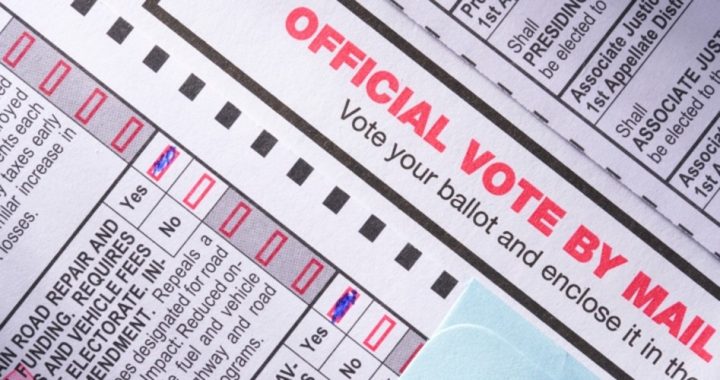
Texas election officials are considering mail-in balloting as a reaction to the coronavirus, the Houston Chronicle reported on March 17. Other states are also considering similar forms of expansionary use of mail-in balloting in response to the coronavirus.
When this nation was first founded, laws allowing absentee voting were extremely rare. This author has seen a reference to proxy voting in early Connecticut. Due to a lack of archives in most states, as well as a loss of whatever archives there were in other jurisdictions, it may be impossible to document exactly how much absentee voting was done in early America. But suffice it to say that it was rare and probably none of it was done in any way resembling today’s absentee ballots.
There have been three methods of absentee voting in America. The first was via the use of a proxy. That is when a voter who can’t appear at the polls on election day appoints a trusted person to cast a vote for him or her in the precinct on election day. An example of such a law was in New York in 1864. The Constitution of the State of New York was amended in 1864 to allow absentee voting for soldiers and sailors who were stationed outside the state. After fierce debate in the legislature in Albany, the only form of absentee voting allowed was by allowing a military man who was stationed outside the State of New York to appoint a proxy who was eligible to vote and lived in the same town or city. This absentee voting was originally only a temporary measure and was only for military voters. This law allowing absentee voting in New York was repealed after the Civil War ended.
The second method of absentee voting was also used during the Civil War and allowed voting in the camps. While some states such as New York would not allow for such voting because it opened the door for officers and others of higher rank to put undue influence on the soldiers as they were voting, there were some states that allowed soldiers to vote in the camps. Because most of the men serving in the Civil War were serving in federalized state militias, it was common that all or most of the men in a company were from the same state. Frequently, the votes were counted in the camps and the results were made public immediately.
The third method, and the one most favored by states today, is the absentee ballot. In this form of balloting, the most commonly used form of security is comparing signatures. As pointed out in the Houston Chronicle article, “The Texas Civil Rights Project has warned that the ballots are not reviewed by experts but instead by everyday eligible voters who just eyeball signatures for irregularities.” Many states process the absentee ballots in non-public places and, consequently, the public doesn’t get to observe the process.
John Fund, in his book Stealing Elections, described an eyebrow-raising chain of custody problem discovered by Melody Rose, a professor at Oregon State University: “Rose herself once stopped by a library after hours to deposit her ballot, only to find an overflowing bin of ballots in the lobby. She could have taken all of them to her car and done some creative pruning based on where people lived or their gender.”
That story illustrates a major problem with absentee balloting. How many people have keys to government buildings or other buildings that are used for accumulation or storage of uncounted absentee ballots? They all have the physical access needed to tamper with an election.
Another problem with absentee ballots is vote harvesting. Some vote harvesting is legal, even if questionable. Vote harvesting can take many forms. One form is when a vote harvester, tipped off by a government employee involved in mailing out the absentee ballots, can visit the voters on the day the absentee ballots arrive in the homes. Assisting voters, where legal, can be fraudulent if the vote harvester gains the trust of a senior citizen with poor eyesight or a bad memory and then marks the ballot differently. Some vote harvesters offer to bring the ballots into the elections department rather mail them. Depending on the state, this is frequently illegal because it is a security weakness in the chain of custody.
The future may pose yet another problem for absentee ballots. As many government schools no longer teach cursive handwriting, the number of people who can’t read or write their own names in cursive handwriting will grow. How long will it be before there is a court case decision saying that requiring signatures on absentee ballot envelopes is unconstitutional because enough people can’t read or write their own names?
In time of crisis, it is critical that freedom-loving Americans heed the warnings of Austrian economist Friedrich Hayek, who warned us that “Emergencies have always been the pretext on which the safeguards of individual liberty have been eroded.” In these times of concern that the coronavirus may be hazardous to our health, reacting emotionally rather than thinking logically definitely is hazardous to our liberty. And safeguarding the integrity of our elections is definitely in order.
While defenders of freedom are heeding Hayek’s words of wisdom, political opportunists focus on the other side the coin. They say to never let a crisis go to waste because it is an opportunity to accomplish things that would not have been possible otherwise. They put attractive veneers on their activities by using such catchy phrases as “Your safety is our highest concern,” or “These unprecedented circumstances call for unprecedented decisive actions.”
Image: Bill Oxford via iStock / Getty Images Plus



